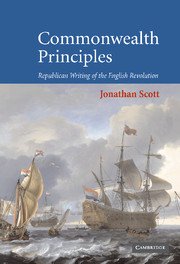Book contents
- Frontmatter
- Contents
- Preface
- Introduction: English republicanism
- Part I CONTEXTS
- Part II ANALYSIS
- Part III Chronology
- 11 Republicans and Levellers, 1603–1649
- 12 The English republic, 1649–1653
- 13 Healing and settling, 1653–1658
- 14 The good old cause, 1658–1660
- 15 Anatomies of tyranny, 1660–1683
- 16 Republicans and Whigs, 1680–1725
- Appendix: ‘a pretty story of horses’ (May 1654)
- Bibliography
- Index
16 - Republicans and Whigs, 1680–1725
Published online by Cambridge University Press: 22 September 2009
- Frontmatter
- Contents
- Preface
- Introduction: English republicanism
- Part I CONTEXTS
- Part II ANALYSIS
- Part III Chronology
- 11 Republicans and Levellers, 1603–1649
- 12 The English republic, 1649–1653
- 13 Healing and settling, 1653–1658
- 14 The good old cause, 1658–1660
- 15 Anatomies of tyranny, 1660–1683
- 16 Republicans and Whigs, 1680–1725
- Appendix: ‘a pretty story of horses’ (May 1654)
- Bibliography
- Index
Summary
[I]t is to bee enquired, whether instead of an inclination … towards a Commonwealth there is not in England a generall dislike to it; If this is so … it will bee in vaine to dispute by Reason whilst Humor is against it…. This maketh all the Republican Schemes, whether borrowed from the Ancient, or invented by the Moderne Doctors in Politiques, to bee no more than dreams … besides [which] … there are … some materials absolutely necessary for the carrying on such a fabrique, which are at present wanting amongst us; I mean Vertue, Morality, diligence, Religion … [so] that a Commonwealth is not fit for us, because Wee are not fit for a Commonwealth.
George Savile, Marquis of Halifax, A Rough Draught of a New Modell at Sea (1687)THE QUESTION OF PARLIAMENTS, 1681–1683
By 1681, opponents of court policies perceived as popish, arbitrary and French faced even more severe problems than the ‘late Prorogations and Dissolutions … strik[ing] at the very Root and being of Parliaments’. As Neville had predicted, a peaceful settlement of the crisis would prove elusive. One watershed was the dissolution of what turned out to be Charles II's last parliament in April 1681. Prorogations were one thing; government in the entire absence of parliaments was another.
This was the more so given the onset of a renewed and amplified religious persecution.
- Type
- Chapter
- Information
- Commonwealth PrinciplesRepublican Writing of the English Revolution, pp. 336 - 357Publisher: Cambridge University PressPrint publication year: 2004

